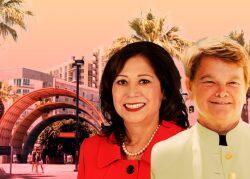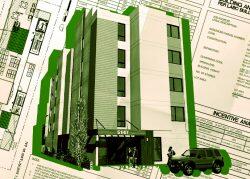A new Crenshaw/LAX rail line has drawn billions of dollars of housing and commercial development into South Los Angeles, raising concerns over gentrification.
The new K Line will provide a key transit link to Los Angeles International Airport, while attracting real estate investment that could transform a historically Black L.A, the Los Angeles Times reported.
The 8.5-mile Crenshaw/LAX Line, which partially opens this week on seven stops, is expected to be fully completed in 2024.
Not far from the new Martin Luther King Jr. station along Crenshaw Boulevard, dozens of new apartments are under construction.
For those who live and work close to the line, neighborhoods are changing fast in the heart of the Black, middle-class Los Angeles – home of mom-and-pop businesses from hair salons to ethnic markets.
But the forces of gentrification are unyielding. Speculative investors are scrambling to get prime land along the rail line, much of which is favorably zoned for commercial space or high-density housing, according to the Times.
“The building beside me is now $2.5 million; a couple of years ago it was $535,000,” Victoria Fortson, a native of Jamaica and owner of the Right Choice Caribbean Market on Crenshaw, told the Times.
Even if she could buy in, she said, she’d fear having to raise rents so high longtime residents would be displaced.
“Why not let us buy a piece of America?” Fortson said. “It’s so sad.”
About 5,000 residential units are either planned or under construction from the Expo Line station in West Adams to the Hyde Park area, said Jamie Brooks of brokerage CBRE Group. The price of office space along the corridor rose 36 percent in 2020 and 22 percent in 2021, while office prices in other parts of the city sagged.
Last year, New York developers bought the struggling Baldwin Hills Crenshaw Plaza for $141 million following a two-year community battle over ownership.
Harridge Development Group, based in Beverly Grove, plans to sink $1 billion into the 42-acre site for an office-retail-housing village.
The $2.1 billion Crenshaw/LAX transit line, three years late and more than $90 million over budget, was promoted after the Rodney King uprising as a way to bring opportunities to South Los Angeles. It broke ground in 2014, but was held up by construction snags.
Officials hope to open it ahead of the 2028 Olympic Games. By 2035, It’s estimated to draw 32,000 daily weekday passengers.
As the Black population of South Los Angeles has shrunk, areas around Leimert Park and Hyde Park remain majority Black and a key source of political power, while becoming a cultural hub for Black musicians, artists and activists.
Manuel Pastor, who co-authored “South Central Dreams,” about the shifting demographics in South Los Angeles, said the rail line could lead to gentrification. But he said it could also bring together siloed parts of the city.
“It’s going to take a part of L.A. that should be better known to a lot of people,” Pastor told the Times. “And it’s going to make it an attractive place to visit, but also to live.”
The Los Angeles County Metropolitan Transportation Authority, or Metro, voted in July to spend $50 million to buy up land along its rail stops to push back gentrification, with the money to be spent on affordable housing.
— Dana Bartholomew
Read more


